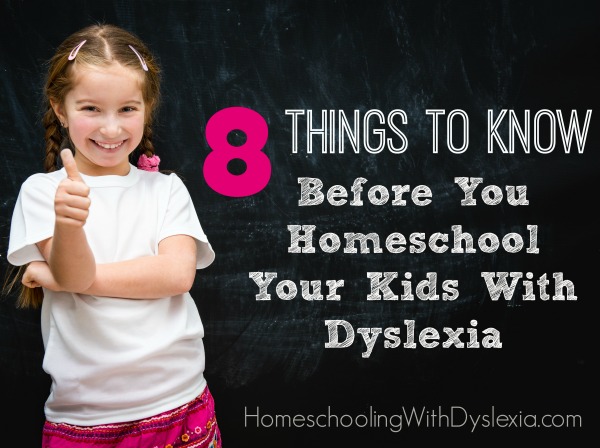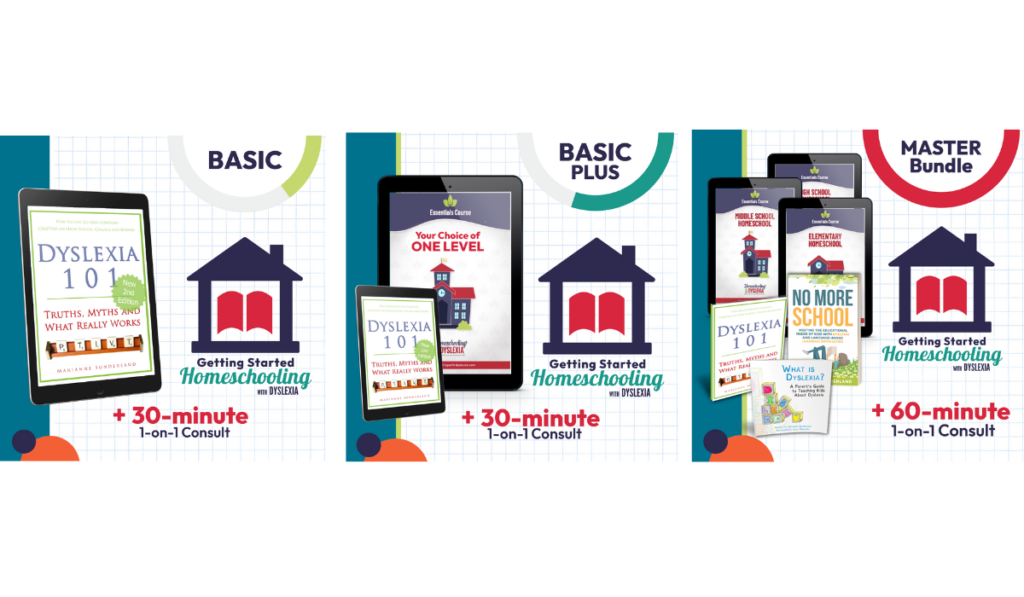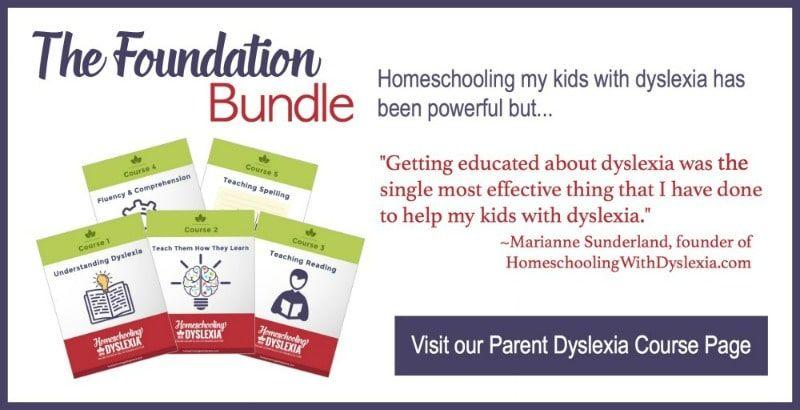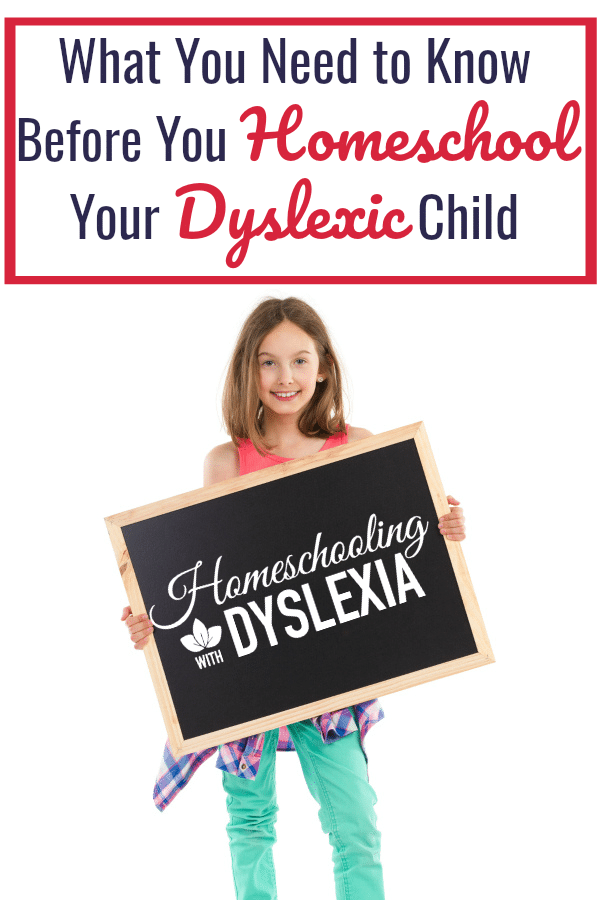“Why can’t you remember this!”
“We just went over this yesterday!”
“Why can’t you pay attention?”
These conversations are just a few of the memories of my early years of homeschooling that I wish I could forget. Those were the days before I realized that my kids didn’t learn like me – or like anyone I had ever known.
They were the days that I misunderstood learning, dyslexia, ADHD, and the beautiful freedom that I had in homeschooling. There are quite a few things I wish I had known before I began homeschooling.
Here are eight things to know before you homeschool your kids with dyslexia.

If you’re new around here, I’ve been homeschooling my 7 kids with dyslexia for nearly 30 years. Five of those kids (and one without dyslexia) have graduated from high school as of this writing/recording.
One of the reasons that I started this site was to share what I have learned and to help people to avoid the painful and sometimes costly mistakes that our family made when we first started homeschooling our kids with dyslexia.
Here’s what I wish I had known:
Homeschool isn’t school at home.
Recreating a traditional classroom at home seems laughable to me today. It is perhaps the most common ‘mistake’ new homeschool parents make. Why bother trying to recreate a traditional classroom environment when we have the freedom to create any kind of learning environment that we wish?
Well, if you’re like me, you probably bought a cute set of color-coded textbooks and workbooks, a student-size desk, and made your kids sit still while you filled their heads with information because that was the only idea of school that you had.
The truth is, and this is especially important for kids with dyslexia and ADHD who learn differently, you get to choose when to do school, when NOT to do school, where to do school, what to teach and how to teach it. You don’t need anyone’s permission to teach the way that engages your kids. That might mean shorter lessons, skipping lessons, doing reading comprehension questions orally, using a calculator in math, etc.
Don’t compare your family’s homeschool experience to others.
The slippery slope of comparison starts with comparing your homeschool to traditional school and continues with comparing yourself to every other homeschooler you come into contact with. Yup. It’s just like middle school all over again.
Why are we so brave to step outside the norm of public school yet so quick to cower in shame when our kids aren’t performing like other kids?
If I knew what I know now, I’d know that my kids excel in some areas and are average or below average in others – just like every other kid out there. I would begin early to look for my kids strengths and help cultivate them instead of focusing on their weaknesses so much.
Some people won’t understand or support your choice to homeschool.
This can be family members, friends, or even your child’s pediatrician. Many homeschool doubters (especially for kids with dyslexia or ADHD) still believe that the schools are the educational experts. Most of us assume that teacher training would include learning about dyslexia and other learning differences. It doesn’t.
What these well-meaning people in your life don’t know is that even reading specialists with advanced degrees don’t have training in what dyslexia is, how to diagnose it, or how to teach these kids the way they learn. As parents it is our responsibility to protect our kids and to provide them with the best learning environment we can.
Many kids with dyslexia in the traditional school setting are feeling anxious and depressed because they are not learning at the pace of their peers and are continually being misunderstood by teachers who still believe many of the myths about dyslexia.
Kids with dyslexia can learn well with the right methods.
Because I grew up in a traditional classroom, and liked it, I never bothered exploring other ways to teach when I became a homeschooler. That is until my smart, creative, outside the box thinkers were bored to tears and not learning! Once I tuned in to my kids’ unique styles of learning, I was able to adapt how I taught them so that they were more engaged and less frustrated. I also learned about the most effective reading method for people with dyslexia – the Orton-Gillingham approach.
You can learn more about what the Orton-Gillingham approach to teaching reading to kids with dyslexia here and read my reviews of the top 4 Orton-Gillingham reading curriculum for parents to use at home here.
Your kids will learn eventually – regardless of which method you use.
While it seemed to me in those early days like my kids would never learn to read, write, and spell – they did; even with my mismatched methods (I didn’t know about Orton-Gillingham back then) and despite my worry. In fact, my mom-instinct told me to just keep reading to them (or use audio books) and sure enough, when they learned to read – they zoomed ahead.
I sure wish I had known that kids with dyslexia learn to read at a different pace than their peers from the beginning. It would have saved me a lot of worry. My oldest kids began reading on their own for pleasure at 12 and 10 years old. This process wasn’t without its issues; namely the embarrassment of not being able to read when most kids have long since learned to read. I am now a firm believer in early intervention with the right methods so that our kids don’t have to fall behind, lose their confidence, and feel stupid.
Enjoy your kids and celebrate their strengths – even if they can’t read yet.
Every child has been created with unique abilities. Looking back at my now adult kids’ lives, I can clearly see how their strengths have helped them as they found successful careers as adults. Homeschooling gives you a unique opportunity to observe your kids’ strengths so notice them, praise them, and encourage them to grow in these areas.
Every dis-ability that kids with dyslexia have has an opposing ability.
People with dyslexia are well known for being able to see the big picture – to make connections that others who think in a more linear fashion are unable to make. The flip side of this ability to think conceptually is that they often miss out on the fine details of a subject. So while teaching these kids to read and write and spell (and sometimes math) can be an uphill battle, don’t lose sight of their real gifts and talents. Learn about the dyslexic strengths and notice and cultivate them in your kids.
Our kids need us to be their advocate and teach them to one day be their own advocate.
Studies on ‘successful’ dyslexics asked what one thing had the biggest impact on their success. The majority of those polled said that it was the presence of at least one caring adult who took the time to understand and help them. That’s you. As a parent of a child (or children) with dyslexia, it is our job to get educated about what dyslexia is (and isn’t) and to help our kids understand what it is as well. Taking one of my Parent Dyslexia Classes is a great way to start.
Resources for Parent Education
If you are looking to get educated about dyslexia and how to educate, encourage and empower your kids with dyslexia, you have come to the right place.
For more information on getting started homeschooling your child with dyslexia, check out my Getting Started Packages that include a 1-hour Master Class and a variety of consulting options. Get the help you need to set up a thriving homeschool for your kids with dyslexia and ADHD!

For more information on specific strategies to teach your dyslexic child the way he or she learns, consider taking one of our Parent Dyslexia Classes.

What tips do you have for homeschooling kids with dyslexia?






I love this. A very timely reminder for me.
Thank you for your help. We recently began homeschooling our 13 yr old dyslexic son. He is sooo far behind. In 6th grade he’s probably on a 3rd or 4th grade reading level. Teachers either couldn’t or wouldn’t help. Yes, I have no idea what I’m doing or how to do it, but just in taking him out of public school his whole countenance has changed. He isn’t stressed when it comes to learning. We even had our first breakthrough when he began trying to read thru the Harry Potter series. He couldn’t get thru the first 2 chapters. I went down to the library and checked out the audio books and WOO-HOO he absorbed every word! He listened to the entire series in less than 1 1/2 months and now has also gotten thru The Hobbit and the Lord of the Rings series. WHAAAT? Amazing! Thanks for the advice and just reminding people like me to keep breathing thru the tough times.
Thanks for sharing your story Sarah!
Hello, I found your site on Pintrest and enjoy reading your tips. I don’t home-school, rather my involvement is as a volunteer, at our local Primary School. (Australia) Currently, there is the dearest little boy in 3rd class with undiagnosed dyslexia and dysgraphia. The idea of audio books is another idea worth introdrucing to the classroom. Thanks
Audio books are the best!
Marianne, this is exactly what I needed to read right now. After administering the IOWA Basic Skills test to my dyslexic 9 yo daughter, I felt like a horrible mom and teacher. I gave her time and reading accommodations but even so, she struggled. My non-dyslexic 13 yo son reminded me that I was expecting her to do a test that is designed for children without learning challenges. I find it hard during this time of year to not feel discouraged by other homeschooling families’ stories of success. At a time when they are “graduating” from one grade to another, I feel like we just need to keep plugging along and repeating a lot of the same material. Of my 5 children, 3 are dyslexic and sometimes it’s hard to see the progress they’re making because it is so much slower and incremental. Thank you for the reminders and encouragement! I’ve decided to not have my dyslexic children do standardized testing until they need to. Instead, I will have them evaluated by a former teacher who will document my children’s specific strengths and weaknesses. Fortunately, the state will accept this as proof of progress.
I love the point you make about not comparing. Not every child learns the same way as the next child. Thank you for sharing these tips!
Great points here. It’s so important to make sure you are giving your child the best experience in learning you can. Thanks for sharing this informative post.
Thank you for your timely e-mails. I am homeschooling my 10 year old grandson who is dyslexic and what a change in his behavior. I ought to have realized years ago that he was different as his mindset was what we called alternative and most refreshing at times. Foundation phase was a nightmare fighting about his sounds and maths. We are now doing tables using his favorite subject – Entomology- six legs, eight legs, two body parts, three body parts of the insects and arachnids – well it seems to be working well. I’m enjoying the challenge too. Having to think outside the “box”. Take care. I look forward to your next letter.
Your first three sentences were me last year!! This year we decided to homeschool due to COVID but it has been the best decision ever and I may keep my little in the middle home (she has dyslexia) because she is thriving!! Thank you! Have you ever tried the C-pen? I am considering this for her when she has to read short sentences if I am not available. (I also homeschool her two sisters). Thanks!!
I wanna to thank you for the help.My name is Dolores I have Dyslexia a nd I had for a long time. I still it because I am still reading a 3th grand leave and I am 45 yrs old. Now my niece has a son how has dyslexia now and she was asking me what help me with dyslexia I told a lot of things helped me.I asked her what dose he need help with his read and writing.He is at the age of 11yrs old so I told her that she many have to go back to preschool for him or were he feel like doing some and their to make it fun for him too.